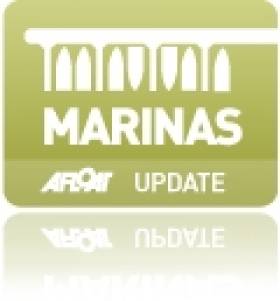Displaying items by tag: glenarm marina
Native oysters are set to flourish once more along the Glenarm coast with the creation of a new native oyster nursery at Glenarm Marina.
The restoration initiative, led by Ulster Wildlife, could see up to 800 million oyster larvae released into surrounding waters every year, allowing these ocean superheroes to bounce back from extinction – boosting biodiversity and reducing water pollution levels.
As regular Afloat readers know, Belfast Lough has also seen a nursery set up, with oysters growing under the pontoons in Bangor Marina.
Ulster Wildlife is creating these native oyster nurseries to help restore the endangered species, which is very different to an oyster farm. The shellfish are not for consumption.
Native oysters (Ostrea edulis) were once abundant along the Glenarm coast up until the mid-1800s when overfishing, disease, invasive species, and pollution decimated the local population. Evidence of their shells can still be seen today along the shoreline.
Now over 800 mature native oysters, sourced under licence from Loch Ryan in Scotland, are being suspended in 30 purpose-built cages over the edges of the marina’s pontoons to help revive the species.
The oysters were screened for disease and cleaned on arrival before being installed.
Dr David Smyth, Senior Conservation Officer with Ulster Wildlife, said: “Despite their small size and insignificant appearance, oysters can bring huge benefits to our marine environment. Already, they have started to filter and clean 162,000 litres of seawater at Glenarm per day, equivalent to 810 bathtubs. And, this summer, they will reproduce, releasing the next generation of oysters onto the seabed to form oyster reefs, providing nursery grounds for fish and shelter for marine creatures. This is a win-win for nature: restoring oysters creates healthier and more resilient seas and their reefs store carbon – crucial if we are to tackle the nature and climate crisis.”
Mid-East Antrim Borough Council, which manages the marina, welcomes the nursery.
Mayor, Alderman Noel Williams said: “We are thrilled to be playing our part in restoring this endangered native species. Nestled at the bottom of the Glens of Antrim, Glenarm Marina is the perfect spot to help revive native oysters. As well as increasing water clarity and quality, the project will also deliver enhanced biodiversity and provide rich cultural value to the area. I look forward to seeing this initiative grow and thrive over the next few years.”
Ulster Wildlife is appealing for volunteers in the local area to help monitor the oysters as they settle into their new home. This involves conducting regular health checks to assess growth rates and surveying wildlife around the cages – email [email protected] to find out more.
This is the charity’s second native oyster nursery. Northern Ireland’s first native oyster nursery was opened in 2022 at Bangor Marina.
The Glenarm oyster nursery is funded by the DAERA Blue Carbon Fund and supported by Wilson Resources.
New Pontoon at Antrim's Glenarm Marina Increases Berths to 50 Boats
Glenarm Marina now has a new fully serviced pontoon increasing the berthing capacity of this Blue Flag popular spot to 50 within the picturesque village's historical limestone harbour on the east coast of County Antrim.
Glenarm lies at the foot of one of the nine glens of Antrim of the same name and has long been a port of call for sailors travelling north and south and across the North Channel, being at most a day sail from both sides of the ancient Gaelic kingdom of Dal Riata or Dalriada.
It encompassed the western seaboard of Scotland and the north-eastern corner of Ireland on each side of the Channel and at its height in the 6th and 7th centuries, it covered what is now Argyll in Scotland and part of County Antrim.
The new 120m pontoon can accommodate 10-12 vessels and is connected to the existing pontoon network allowing access to the shore by a bridge.
The £250k project, led by Mid and East Antrim Borough Council has been part-funded through Tourism Northern Ireland's Tourist Industry Scheme to encourage tourism growth here.
 Glenarm Marina can be a base for visitors to explore both the Glens of Antrim and the Causeway Coastal Route
Glenarm Marina can be a base for visitors to explore both the Glens of Antrim and the Causeway Coastal Route
Former Mayor of Mid and East Antrim, Cllr Peter Johnston said: "The marina provides facilities for both berth holders and visiting vessels including, toilets, showers and laundry facilities, Wi-Fi, a mobile pump-out station and a disability hoist. Glenarm is a great base for visitors to explore both the Glens of Antrim and the globally renowned Causeway Coastal Route that twists and turns along the County Antrim coastline, and is quite simply a journey unlike any other".
 Glenarm Pontoon refurbishment: Mayor Peter Johnston, Mid and East Antrim BC, and representatives of Tourism NI, Civco and Gavin & Doherty Geosolutions
Glenarm Pontoon refurbishment: Mayor Peter Johnston, Mid and East Antrim BC, and representatives of Tourism NI, Civco and Gavin & Doherty Geosolutions
Rosemarie McHugh, Director of Product Development at Tourism NI, commented: "We are delighted to support this latest addition to the tourism product here in Northern Ireland. The fully serviced pontoon, situated at the Marina in Glenarm, is a fantastic base for visitors to explore the Glens of Antrim and the stunning Causeway Coastal Route. It also plays an important role in helping us rebuild and recover our tourism sector."
Glenarm Marina. Yachts and Boating Berths in Northern Ireland
Glenarm has long been a port of call for sailors and yachtsmen travelling to and from Scotland's island-studded western coast and has proved a welcoming haven to visitors from all over the world.
Glenarm Harbour offers 40 fully serviced pontoon berths within the village's historical limestone harbour, which is ideally situated within a day's sail of the Western Isles and Clyde. Visiting vessels welcome.
Glenarm Harbour
Glenarm, Co.Antrim, BT44 0EA
Telephone: 028 2884 1285






























































